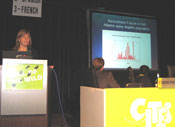Good turn out for CITES side event on sharks and sawfish

by Dr. Onno Gross, Deepwave
Around 100 people gathered to listen to speakers at a side event on protection efforts for sharks and sawfish at the Fourteenth Conference of the Parties to the Convention on International Trade in Endangered Species (CITES).
The event was organised by the Shark Alliance and the Species Survival Network and took place over lunch during committee meetings on the proposals to list spiny dogfish and porbeagle sharks taking place in The Hague.
Caroll Muffett from Greenpeace opened the session, welcoming the delegates and observers at the Atlantis conference hall. Fins, meat, liver oil, teeth, skins, and belly flaps - the list of shark parts being internationally traded is long. However, despite substantial commerce, restrictions on international trade are in place for only three shark species ; basking, whale and white sharks.
Spiny dogfish and porbeagle shark populations have been seriously depleted by targeted, poorly regulated fisheries. The EU proposals spearheaded by Germany to list these sharks have been endorsed by the World Conservation Union (IUCN), the CITES Secretary and others. The IUCN classifies both species as globally Threatened and Endangered in the US Atlantic.
Sonja Fordham gave a presentation on the spiny dogfish, one of the most vulnerable of all sharks today. Like the porbeagle, they are considered Endangered in the Northwest Atlantic and Critically Endangered off Europe. According to WWF, stocks of reproductive females have declined by 95 percent in the Northeast Atlantic and by 75 percent in the Northwest Atlantic.
Driving targeted fisheries worldwide is the European demand for fish and chips and smoked belly flaps. A new fishery has just started in the southern hemisphere, with countries like Argentina stepping in to meet the fast-growing European demand. In the light of little or no fisheries management of this species, Fordham stressed the urgent need to limit international trade by listing this species under CITES.
In a presentation on the porbeagle shark, Sarah Fowler, co-chair of the the IUCN Shark Specialist Group, noted that porbeagle meat is among the most prized in Europe, with fins being sent to Asia for use in shark fin soup. Figures show a clear decline in northern landings between 1964 and 2004. As one fishery is depleted, fishing vessels move to other areas. Fowler noted that it took only six years to deplete the West Atlantic stocks. Now the fishery has moved to the southern ocean where species grow much more slowly and may, therefore, be much more vulnerable to depletion than those in the north.
John Carlson of NMFS clearly demonstrated the need to protect sawfish (Family Pristidae) in his presentation on the trade in this species. Sawfish are traded at internet platforms such as Ebay for their rostrum - the "SAW-nose" - fetching 1,300 USD and more. Asian States in particular are buying from African states, as Dorothy Nyingi from the Natural Museum of Kenya showed in her preliminary study on the Kenyan sawfish trade. Trawlers fishing for sawfish are also responsible for the loss of habitats and over-exploitation of the species.
The urgent need for management plans for these sharks, was one of the main recommendations from the event.






